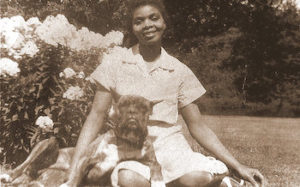
Irene Kirkaldy
Irene Morgan Kirkaldy was born on this date in 1917. She was a Black educator and civil rights activist.
Kirkaldy was born Irene Morgan in Baltimore, lived on Long Island, and ran a child-care center in Queens with her second husband, Stanley Kirkaldy, for many years. Yet Kirkaldy is best known as the Black woman who refused to give up her bus seat to white passengers more than a decade before Rosa Parks gained recognition for doing the same. Kirkaldy was arrested in 1944 for refusing to give up her seat on a Greyhound bus heading from Gloucester, VA, to Baltimore and resisting arrest.
Her case was appealed to the U.S. Supreme Court by (then) NAACP lawyer Thurgood Marshall, who later became the first Black justice on the Supreme Court. Morgan v. Virginia ruled on June 3, 1946, that Virginia law requiring the races to be separated on interstate buses, even making passengers change seats during their journey to maintain separation if the number of passengers changed, was an invalid interference in interstate commerce. At the time, the case received little attention, and not all bus companies complied with the ruling, but it paved the way for civil rights victories, including Parks' famous stand on a local bus in Montgomery, AL., in 1955.
Kirkaldy also inspired the first Freedom Ride in 1947, when 16 civil rights activists rode buses and trains through the South to test the Supreme Court decision. Kirkaldy, then a young mother, boarded the Greyhound bus in Hayes Store, VA., and sat toward the back for her ride home. She was recovering from surgery and had taken her two children to stay temporarily with her mother in Gloucester. The driver told her to move a few miles down the road because a white couple wanted to occupy her row. "I said, 'Well, no,'" she recalled. "That was a seat I had paid for." Kirkaldy willingly paid a $100 fine for resisting arrest because she did kick the officer who tried to remove her from the bus.
She said she didn't mind the relatively little notice her achievements brought. At age 68, she received a bachelor’s degree from St. Johns University, and five years later, she obtained a master's degree in urban studies at Queens College. She lived out of the spotlight for decades after the case and lived most of her life in New York State. "If there's a job to be done, you do it and get it over with and go on to the next thing," she told The Washington Post in 2000.
In 2000, Gloucester County, where the bus incident occurred six decades earlier and where she lived in her final years, honored her on their 350th anniversary. In 2001, President Bill Clinton awarded her the Presidential Citizens Medal. When asked where her courage came from in 1944, Kirkaldy said: "I can't understand how anyone would have done otherwise." She was not part of any organized movement.
Irene Kirkaldy died on August 10, 2007. She was survived by her daughter, Brenda Morgan Bacquie of Hayes, and her son, Sherwood Morgan, Jr., of Dover, DE.; her sisters, Justine Walker, of Baltimore, and James Ethel LaForest, of Upper Marlboro, Md.; five grandchildren; and four great-grandchildren.